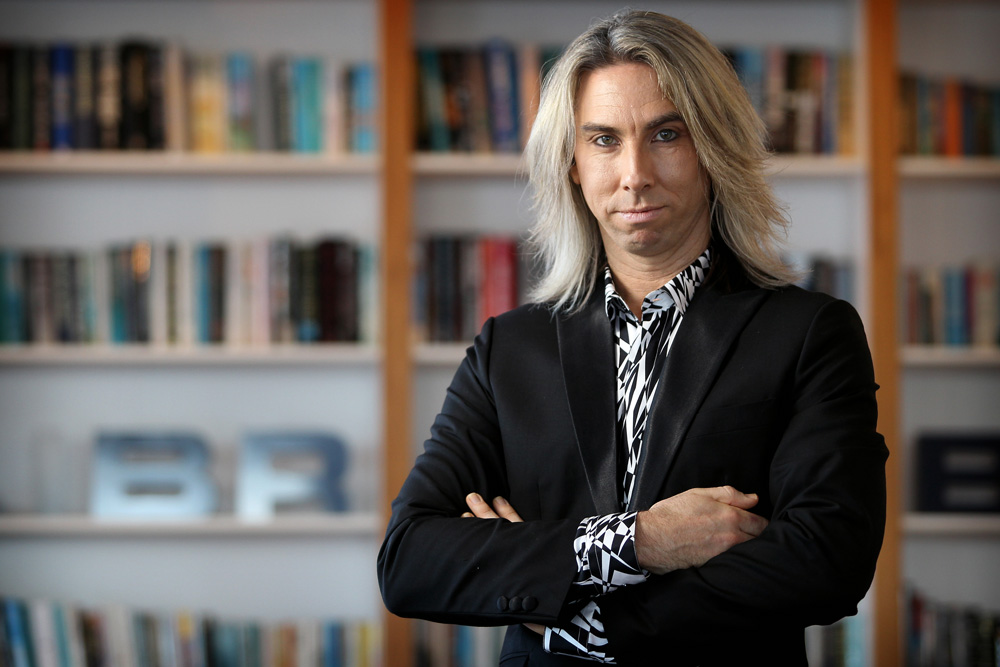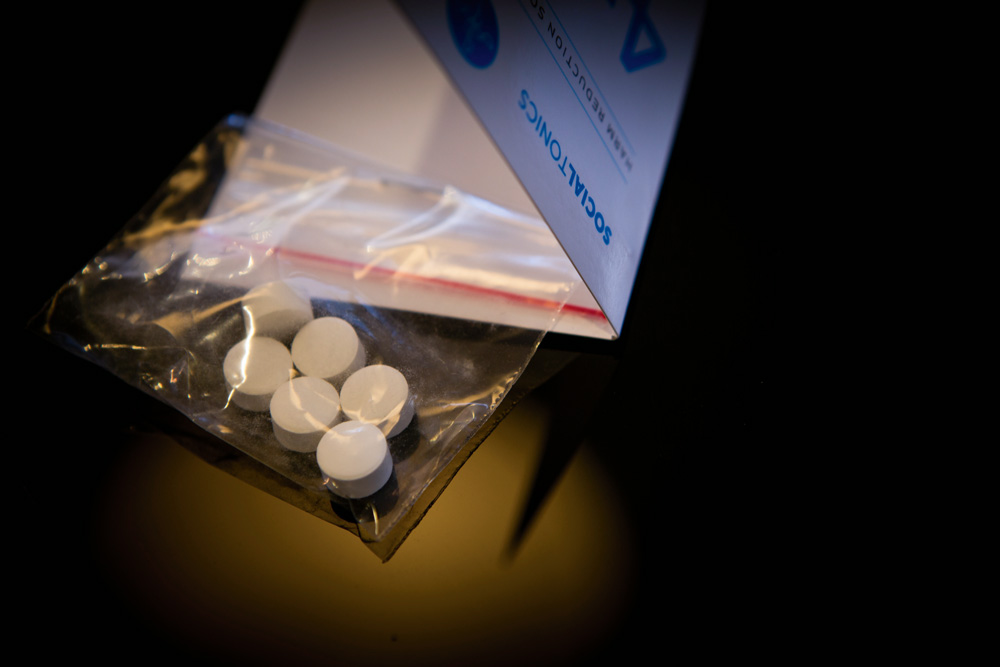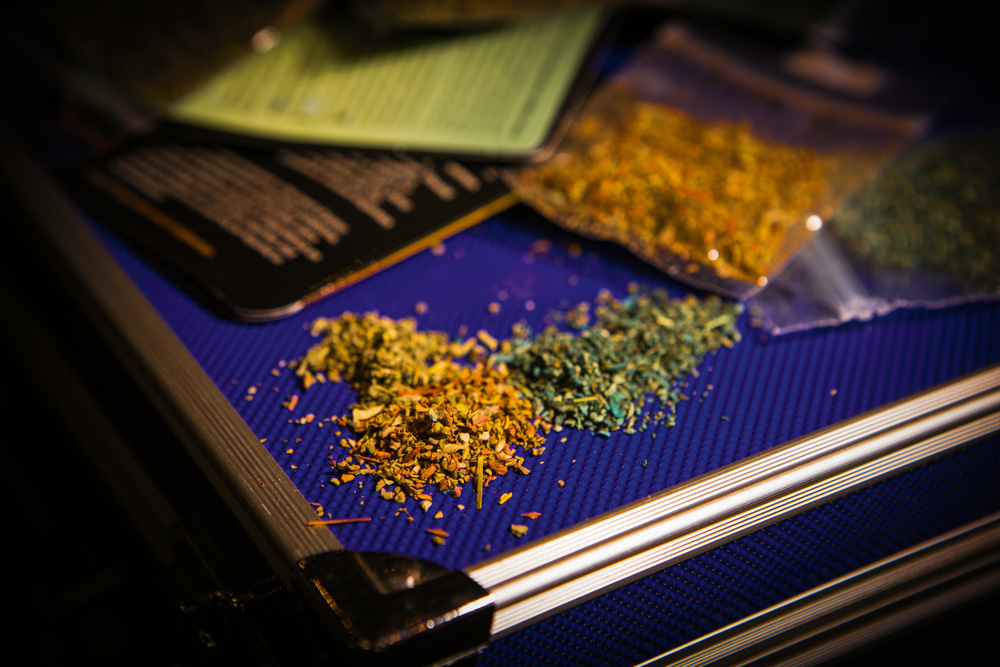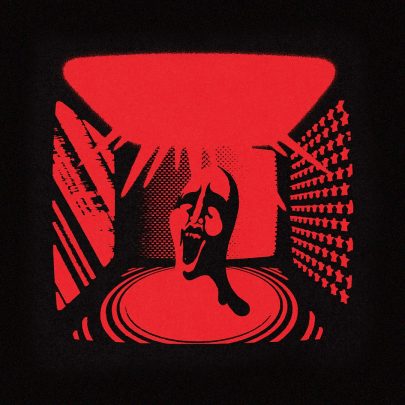Mar 16, 2015 Film & TV
This story was first published in the July 2013 issue of Metro. Photos by Vicki Leopold. Above: Star Trust general manager Grant Hall.
The face of the legal-high industry used to be a rock musician and former junkie who wore mascara, nail polish and shiny coats and called himself Starboy. If Matt Bowden was trying to prove to the nation’s parents that he was Mr Responsible where their kids’ recreational drug use was concerned, he was probably the wrong man for the job. He didn’t just frighten the horses, he scared the shit out of them.
While Bowden’s message was on song — he was the first to call for licensing and regulation of party pills, and opposed sales in dairies — his sometimes bizarre persona was always a distraction. He once told a television journalist it didn’t hurt that he looked colourful when he spoke to politicians. “So this guy can open doors that a guy in suits can’t?” the reporter asked. “Starboy can materialise in a room. He doesn’t even need doors,” Bowden replied. Self-parody, perhaps, but it may not have helped the cause.
Now, as the legislation he has long campaigned for gets fast-tracked through Parliament in the form of the Psychoactive Substances Bill, which will force manufacturers to prove that legal highs such as synthetic cannabis are low risk, Starboy has left the building.
These days, all roads in the legal-high business lead not to Bowden’s door — if he ever had one — but to its new face, Grant Hall, who looks like the sort of bloke every mum wishes her daughter had brought home.
Contact most of the key players in legal highs and they’ll send you to Hall. He’s the general manager of new industry group the Star Trust, and speaks for about 80 per cent of manufacturers, including two of the biggest, Matt Wielenga and Zaid Musa.
Wielenga owns Albany-based Lightyears Ahead — which marketed and distributed the Bowden-created synthetic cannabis Kronic before it was banned in the government’s temporary crackdown two years ago — while the lesser-known Musa is a Mt Albert Grammar old boy who’s run Enjoi Products, a manufacturer and exporter of legal highs, since 2005.
Hall knew Bowden and Wielenga from his days in event management 20 years ago, when he also ran K’ Rd nightclub Sinners. He contacted Bowden last year to tell him that with legislation looming, the industry needed a cohesive voice and he was the man to front it. With Bowden about to take his Starboy show on tour in Europe with his wife, former Penthouse Pet Kristi, and children, he gratefully passed the baton.

For Hall, who once described himself as an “enviropreneur” marketing bottled water (water!) and biodegradable bottles, the new job is a much harder sell, but he’s been defusing public and parental wrath by fronting up at hostile community meetings around the country.
In Invercargill in early June, he says, “daggers were out” as he tried to put the industry’s case to a volatile audience of 60. “It was pretty intense,” he told Star Trust members in an email debrief the next day. “The hardest part was a mother on crutches after being beaten up by her son (while on K2?) and sharing her story while crying in front of us all.”
He stayed on after the meeting with a smaller group of the most concerned people “to advocate and stand up for the right to sell licensed low-risk products to educated consumers” in the regulated era. “Eventually I won them over — and they recognised, to a point, the legitimate reality of our industry and our place in the community. This was a victory of sorts but a very emotionally charged night and one that impacted me greatly.”
After a similar meeting in Dunedin in May, Hall persuaded Lightyears to “retire” its top-selling K2 brand, named as the culprit in many adverse-effects incidents involving young people. “I wasn’t very popular,” says Hall. “When you think of the value of that brand to the owner — it was worth millions and millions of dollars and had been out there for years and years and had tens of thousands of loyal and happy customers who used it every day. But it showed some goodwill. It’s taken the steam out of the kettle.”
It’s all part of the plan to prove to legislators that the makers of legal highs are ready to step out of the underworld murk to become responsible players in the newly legit business. Until now, only the sleight of a chemist’s hand has kept them out of court.
Arguments around decriminalisation haven’t changed for 50 years. One side accepts that for millennia, man has wanted to get off his face (betel nuts, anyone?) and prohibition has never stopped him finding ways to do so.
We already have alcohol and tobacco, which kill far more people anyway, so why not regulate and legalise far safer alternatives, thus keeping kids away from gangs selling the stuff and out of the clutches of the cops and the courts? After all, more people have died protecting us from the evils of cannabis — four police have been killed on pot-related duties — than have succumbed to the drug itself.
Then there are those who argue softer drugs are harmful enough in themselves or a gateway to highly addictive and dangerous drugs, and that just because other damaging products are legal doesn’t mean we should add to the ways we can legally do ourselves harm.
“Forget about decriminalising drugs — let’s criminalise Matt Bowden’s hair.”
The decriminalisation lobby gained a mandate of sorts when Duncan Garner and Guyon Espiner hosted a debate on TV3’s The Vote in May that ended with overwhelming support for legalising synthetic and natural cannabis. Bowden appeared briefly in a pre-recorded clip at the end of the show, vowing to set up a “new kind of pharmaceutical company” creating safe alternatives to dangerous drugs, with profits going into research and rehab.
The message made sense. But all many people saw were the cornrows in his hair. “It was lucky for the debate they put him on last, really,” says one participant. “Most of the comments after the programme were about his hair. Forget about decriminalising drugs — let’s criminalise Matt Bowden’s hair.”
“He has a polarising persona,” Hall admits. “And he genuinely doesn’t want to be fronting the industry.”
Now that is all down to Hall, a 48-year-old green-tea-drinking, non-(tobacco)-smoking gym junkie. Hawke’s Bay born and Palmerston North raised, Hall left for seven years of OE in 1985, attending Utrecht University in The Netherlands and working as a photojournalist covering events from the fall of the Berlin Wall to the Lockerbie disaster. “During that time, I probably tried every drug, illicit or otherwise, but my one addiction was coffee.”
Hall describes himself as the industry’s “voice of reason”. “We have rogues who tar legitimate players and do terrible things. That’s why we want to see these controls in place.”
Metro inquiries reveal at least three people who’ve been involved in selling legal highs in Auckland are facing charges relating to illegal drugs — although none is represented by the Star Trust. We can’t say more because of court suppression orders.
The head of the drug squad said: “I hope the title of your article is ‘Greed’ — that’s what it’s all about.”
As you might expect, Auckland metro drug squad head Detective Inspector Bruce Good is unimpressed with the industry. “I hope the title of your article is ‘Greed’ — that’s what it’s all about,” he told us. “They don’t give a damn what is inside the stuff. They’re just making money — and there’s so much money to be made.”
Some estimates put the size of the industry at as much as $35 million a year, although the actual figure is likely to be higher, based on property seizures from some recent police operations and the fact the biggest manufacturers export their products overseas.
But the new law is likely to squeeze some smaller players out of the market because they won’t be able to afford the significant sums required to pass the new safety-testing regime.
When the legislation becomes law in late July, the only products able to be sold will be those that are licensed, or those for which a licence has been sought and tests are pending. The application alone costs $180,000; the tests — to determine if the product is indeed “low risk” — could take up to two years and cost $1 million-$2 million more.
Members of the government-appointed expert advisory committee charged with designing the safety testing told Metro they will have failed if none of the compounds passes — the legislation is not intended as a de facto ban. But they said given the dangers of smoking anything at all, it’s unlikely a “combustible” will get there.
Hall says of the roughly six products being put forward by Star Trust members, at least one is likely to be a smoking product. He thinks punters enjoy the social ritual of rolling and sharing a “joint”, and if no smokes are licensed, many consumers might return to cannabis. The other applications will be for e-cigarettes and tablets.
We asked committee chair Richard Robson, who is a pharmacologist and Otago University associate professor of medicine, if the fact a substance was psychoactive made it almost by default not low risk. “It does in my book,” he said. “I think there’s a degree of unpredictability which would in my opinion tend to push them all into a high-risk category.”
But he said the government did not want the industry to go underground, and prohibition was unhelpful. He hinted a likely solution was related to dose. “My view — and it’s only personal — is that you’d have a size of x milligrams and you only sold one. Of course, that doesn’t stop people stockpiling 10, but that’s true of other things.”
While clinical trials for medicines are assessed on their risk-benefit ratio, recreational drugs have no clinical benefits, making that judgment more difficult. After toxicology and carcinogenicity tests, the drugs are likely to be trialled on hundreds of volunteers.
A common criticism of the industry is that it’s been prepared to market drugs with potentially unpredictable side effects without being sure they’re safe. Even Hall concedes cannabis is safer.
Auckland University cannabinoid expert Michelle Glass, an associate professor of pharmacology, says when the psychoactive ingredient in cannabis, THC, binds to the cannabinoid receptors in our brains, it does so with less potency and efficacy than its purpose-built relatives. We all have cannabinoid receptors because our bodies make cannabinoids, which are involved in controlling processes from mood and movement, through to appetite, energy and balance.
Glass says science students have often asked her about legal highs. “They think that because they’re legal, they must be safe, and that’s so patently not true. They don’t have a history of use and the hospital admissions are saying they’re clearly not safe.”
She says international research has linked two deaths with the products. “I think your brain is too precious to do this to.”
Wellington addiction expert Dr Jeremy McMinn, who appeared in The Vote on the side of decriminalisation, says some legal products seem to be unsafe in their own right and “the legal-highs industry is not fronting up about that”.
“Some of the products are harmful and we don’t know which ones. Some are harmful for some people and we don’t know which people, and some are being used in a harmful way which the manufacturers don’t approve of. So it’s all of those.”
While Hall agrees the current situation “isn’t perfect”, he says that’s why the industry is welcoming regulation. “There’s a large market of law-abiding people who want to enjoy a cannabinoid effect and this is the only way they can do so without breaking the law. “Tens of thousands of people every week consume these products without any issue whatsoever.”
Until now, products have been tested only in small focus groups of volunteers, by the manufacturers or the Star Trust — which says it has a waiting list of 100 willing guinea pigs — and R18 retailers told us their staff often tried new products so they could advise customers.
Hall says people get into trouble with legal highs only when they’re abusing them — by taking too much at once, when they’ve also taken other drugs or alcohol, or when they’re too young.
He was grumpy with Duncan Garner’s demonstration in May, when the RadioLive host became “on edge, wired, agitated and argumentative” after smoking a whole joint of Juicy Puff synthetic cannabis before a show — as part of a campaign to have the products removed from dairies. Hall says no novice user should smoke a full joint at once.
There were no instructions on the product, which was custom made for the national chain of Cosmic Corner stores, but owner Mark Carswell told Metro the retail assistant advised Garner to take “a tiny puff and wait and go from there”. Garner says he recalls being told to “just smoke it like a joint”.
Garner says Cosmic Corner staff were knowledgeable and helpful, though. They rated Juicy Puff at a 7/10 strength — a “manageable” hit. The Juicy Puff packet has since been changed and now includes directions.
The only issue on which the public, parents, politicians and the industry agrees is that dairies are the last places that should be selling psychoactive drugs.
Hall says Bowden tried unsuccessfully to keep legal highs out of dairies about 10-15 years ago. His company, Stargate, had refused to supply them with its popular BZP party pills and also persuaded other key players, then part of the industry group Social Tonics Association of New Zealand (STANZ), not to supply them, but the retailers found alternative distributors.
“Dairy owners then went to adult stores, bought up in bulk, and resold. STANZ asked the adult stores not to sell to dairies because it wasn’t a good look for the industry. Some of the dairy owners went to the Commerce Commission and said it wasn’t fair and STANZ received warnings and threats from the commission because they wouldn’t supply dairies.”
While the Commerce Commission has confirmed it received a complaint in 2006 about anti-competitive tactics from STANZ, its files suggest a slightly different scenario. It says the complaint alleged STANZ was trying to limit competition by telling retailers (including dairies, video, convenience and liquor stores) that it would stop supplying its products if the retailers dealt with non-STANZ suppliers.
While the investigation did not proceed, it says, it advised STANZ of the risks of anti-competitive behaviour and said it should be careful with any efforts to exclude non-STANZ players from the market.
Hall says dairy owners who sold to minors were “shameful”, but the police had not acted on his complaints.
Shops such as The Hemp Store and Cosmic Corner have sold legal highs in Auckland since the mid-90s. Long-time cannabis campaigner and researcher Chris Fowlie opened the Hemp Store in Auckland in 1996 with soon-to-be Green MP Nandor Tanczos, while Cosmic Corner opened a year later.
“Our motivation was to show the futility of cannabis prohibition,” says Fowlie, who imported the first synthetic cannabinoid, Spice, in 2000 before Bowden gained distribution rights a few years later. While the bulk of the shop’s sales are hemp products, it also sells herbal cigarettes, teas and party pills, and pipes.
It’s generally agreed that when sales were confined to “head shops”, problems were few, but the wheels fell off when they went “mainstream”. Fowlie, a member of STANZ when party pills went into dairies, recalls Lightyears initiated the move to head off copycats and “cowboys”.
“They knew if they only sold to shops like us someone else would enter the market, so I’m assuming they thought, ‘Let’s get in there first.’
“When BZP crossed over into the mainstream,” he adds, “people who would never normally take Ecstasy were all of a sudden taking party pills and their attitude was to get the big packet of 20 pills and take the whole lot. The novice users were the ones causing the bad reactions and the problems.”
The more bad publicity the party pills got, the more they attracted the novices and the more problems they created. BZP was finally banned in 2008. It’s the same sort of vicious circle that surrounded Kronic in 2011 and K2 this year.
Outlets will be licensed under the new law — possibly by councils in the same way as liquor stores. The Hemp Store already has a strictly R18 policy. “Our customers are older, usually in their 30s and 40s, they’re responsible, they’ve got jobs,” Fowlie says. “We are constantly asking, ‘How’s your life going?’ and, ‘How’s your health?’ and we haven’t had a single negative comment.”
The Hemp Store does not display its synthetic cannabis products, keeping them under the counter and showing pictures of the packaging in a small photo album only when asked.
“It’s like a brothel. You don’t want a sign outside saying you can have sex or a $20 blowjob inside. It’s seedy, and we want to be the opposite of seedy. We want to be responsible and upmarket.”
Ironically, says Fowlie, a lot of the older synthetic compounds with a longer history of use, which were among the first to be banned, were potentially safer than those on the market now.
It’s possible the industry will have to come up with weaker compounds and so-called partial agonists that don’t act as effectively on our cannabinoid receptors, to get across the safety bar.
The new legislation is being rushed into law to take effect in August, when the two-year temporary ban imposed in 2011 on the first batch of legal highs expires. But there’s still uncertainty about how some aspects of the law will work.
Hall and Fowlie say most public concerns will be allayed simply because the products will vanish from dairies, so sales to minors will plummet. Had they not been there in the first place, it’s likely many of us would never have heard of “legal highs”.
While the likely disappearance of synthetic “joints” may send some users back to cannabis, Fowlie isn’t worried that the governmental nod will encourage more of us to dabble in legal highs.
“If people make a decision that something is okay or not based on what the government tells them, they need to open their eyes and make decisions for themselves. Alcohol kills 17 people every day in New Zealand, and even more die from tobacco.
“Just because something is legal doesn’t mean it’s safe. It’s really important to separate feelings about whether we like or dislike a drug and what the law should be.”







